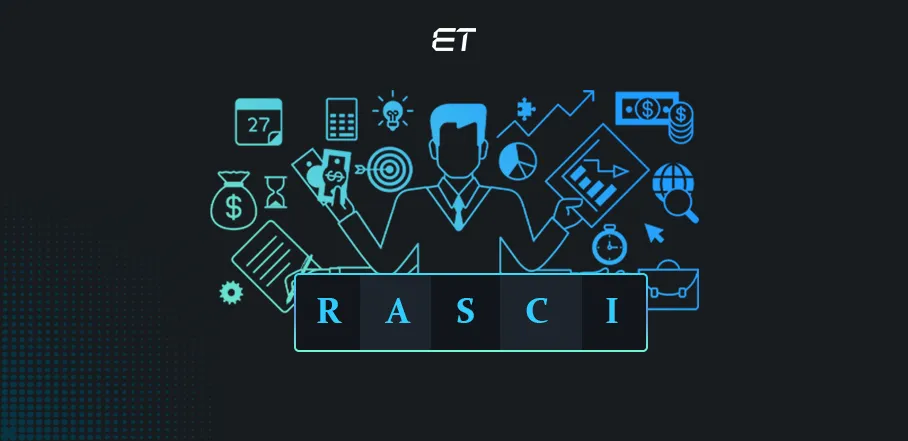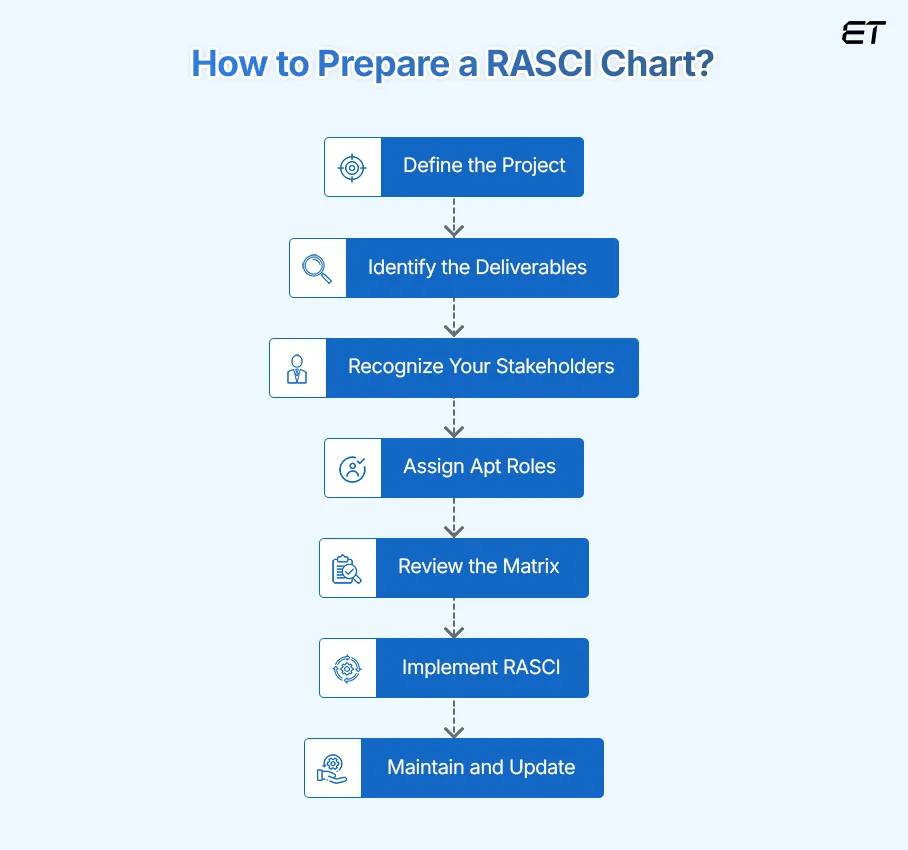
The RASCI Matrix: Definition, Uses, Roles, Examples and More
‘Trying to manage a project without project management is like trying to play a football game without a game plan.’ – Katherine Tate.
If you want to deliver a successful project, your management should be spot-on. That’s where the RASCI matrix proves like a catalyst. RASCI stands for Responsible, Accountable, Supportive, Consulted, and Informed.
Think of it as a blueprint that helps the project manager in assigning tasks to your team members. Notably, the RASCI matrix template has quite a splendid use in several complex projects. So, if you want to increase the probability of your project’s success, understand this interesting concept.
Our blog decodes the meaning, use, steps, and scope of RASCI. Scroll ahead to get enlightened.
Partner with a group of developers managed by expert Project managers. Leave your requirements and we’ll get back to you.
What is the RASCI Matrix?

The RASCI matrix is a project management framework that helps define and clarify team roles and responsibilities for better collaboration.
Basically, RASCI is a tool that finds its utility in project management. Here are the five terms in its name:
1.R: Responsible
2.A: Accountable
3.S: Supportive
4.C: Consulted
5.I: Informed
The RASCI matrix is straightforward to comprehend. In addition, it is beneficial for strengthening core areas of project development.
RASCI Definition of Roles
Before you assign roles in your project, it’s vital to understand what each RASCI category means. Here’s a quick breakdown to help you use the matrix with clarity:
- Responsible: These are the doers of the task. They handle the work directly. Multiple people can be responsible for a task.
- Accountable: This person is answerable for the task’s outcome. Only one person should be accountable per task to avoid confusion.
- Supportive: They provide assistance or resources to the responsible folks. Their input ensures smooth execution without owning the task.
- Consulted: These are the subject-matter experts. You loop them in for advice, guidance, or feedback before moving forward.
- Informed: They aren’t involved in decisions but need to stay updated. You keep them in the loop to maintain transparency.
Having clarity on these roles ensures everyone knows where they stand. So, you don’t have overlaps or confusion.
Why Use the RASCI Matrix?
Take a look at the table below that offers a straightforward answer to this basic question.
| Why Use the RASCI Matrix? | |
| Benefit | Explanation |
| Clarity | It defines who does what |
| Accountability | The matrix helps assign ownership for each task |
| Communication | It streamlines who needs to be consulted and informed |
| Efficiency | RASCI prevents duplicated effort and optimizes the use of resources |
| Project Success | It increases the likelihood of on-time project delivery |
All in all, you can leverage the RASCI project management tool and experience the difference in the output of your project.
Vertical and Horizontal Analysis in RASCI Chart
Creating a RASCI chart is just the beginning. Analyzing it smartly is what unlocks its true potential. This is where vertical and horizontal analysis step in.
These two perspectives help you spot imbalances, overlaps, or role confusion early on. Let’s get straight into the details.
Horizontal Analysis (Row-wise)
In a RASCI chart, each row represents a task or deliverable. A horizontal scan helps you answer:
- Does every task have someone responsible?
- Is there a single accountable person per task?
- Are there too many people in consulted or informed roles?
This analysis ensures that no task is left idle, and that you’re not overloading communication channels.
Vertical Analysis (Column-wise)
Now look vertically. Each column represents a person, role, or team.
Ask yourself:
- Is someone accountable for too many tasks?
- Are key individuals being stretched across multiple roles?
- Are some team members left underutilized?
Vertical analysis helps balance workloads and ensures the distribution of responsibility is realistic and fair.
RASCI Matrix: Model Structure
Now that you know the what, why, and how of RASCI, let’s look at the structure of the matrix.
The RASCI model is in a grid format that maps out tasks against roles or team members. Here’s how it usually looks:
| Task | Project Manager | Developer | QA Lead | UX Designer | Compliance Officer |
| Define Requirements | A | R | C | S | I |
| Design Prototype | C | S | I | R | I |
| Code Implementation | I | R | S | C | I |
| Testing & QA | I | S | R | C | A |
| Compliance Review | C | I | I | I | R |
How to Read It:
- Rows represent project tasks or deliverables.
- Columns represent people, roles, or teams.
- The letters (R, A, S, C, I) indicate who’s doing what.
This visual format brings clarity and eliminates guesswork. Everyone knows their part, and project managers can spot overlaps or gaps instantly.
The Practical Use of RASCI Matrix
By now, some of you might be thinking RASCI sounds more theoretical. How can assigning tasks and segregating the to the project team members lead to success?
So, to solve your query, we present three practical utilities where you can use the RASCI matrix template:
- Planning
- Execution
- Operations
Let’s decode each utility one by one.
RASCI Matrix Example for Software Development Team
In this section, we consider the use case of project planning for a hypothetical mobile app development task. In the subsequent section, the use case will shift to execution in which we apply the matrix for a training program on cybersecurity protocols.
1. Project Planning

Let’s say you want to launch a new mobile app. The RASCI matrix can help define the roles and responsibilities in this case.
The following table will give you a decent idea of the RASCI matrix template for our example
| Example: Mobile App Development | |||||
| Task | Responsible | Accountable | Consulted | Informed | Supportive |
| Market Research | Person 1 | Person 2 | Marketing Team | Senior Management | Research Agency |
| App Development | Dev Team | Person 3 | UX/UI Designers | Project Stakeholders | QA Team |
| Marketing Campaign Creation | Marketing Team | Person 4 | Sales Team | Senior Management | PR Agency |
| App Store Submission | Dev Team | Person 3 | Legal Team | Project Stakeholders | – |
| Post-Launch Monitoring | Support Team | Person 5 | Dev Team | Senior Management | Marketing Team |
As you can notice, RASCI simplifies the task allocation and keeps everyone in the loop. It bolsters planning by enabling the following:
- Upfront definition of roles
- Alignment of the work breakdown structure (WBS)
- Systematic resource allocation
- Communication planning
- Risk management
The best aspect of the RASCI matrix is that the chart is self-explanatory. You can even relate the activities and responsibilities by observing the template. In addition, you can track the responsible person and all the tasks for efficient decision making.
2. Project Execution

We can correlate RASCI with efficient project execution through another hypothetical example. Let’s consider your HR department has to organize a company-wide training program on new cybersecurity protocols.
The RASCI matrix, in this case, will look mostly like the table below.
| Example: Training Program on Cybersecurity Protocols | |||||
| Task | Responsible | Accountable | Consulted | Informed | Supportive |
| Curriculum Development | Training Team | HR Director | IT Security Experts | Senior Management | Subject Matter Experts |
| Scheduling | HR Assistant | HR Director | Department Heads | All Employees | Facilities Team |
| Communication | HR Assistant | HR Director | Marketing Department | All Employees | IT Department |
| Training Delivery | Trainers | HR Director | IT Support Staff | Department Heads | Training Team |
| Post-Training Assessment | HR Analyst | HR Director | IT Security Experts | Senior Management | – |
As you can notice, RASCI simplifies the task allocation and keeps everyone in the loop. It bolsters planning by enabling the following:
- Upfront definition of roles
- Alignment of the work breakdown structure (WBS)
- Systematic resource allocation
- Communication planning
- Risk management
The RASCI matrix made planning quite a breeze, right? Notably, you do not need valuable subject matter expertise to create such a chart. Just Consider the following points:
- During the training rollout, the ‘HR Assistant’ can use this chart to confirm training room availability with the ‘Facilities Team’
- The accountable person, ‘HR Director’ can monitor the progress of scheduling
- Also, the ‘Trainers’ can contact the ‘IT Support Staff’ to sort out technical difficulties
As you can notice, you can connect any role with various attributes and keep a track of the task assignments. So, it’s safe to say that RASCI promotes the following facets in this example:
- Task management
- Communication
- Adaptability
- Status tracking
Overall, you can implement the RASCI framework under any circumstance after gaining valuable experience and knowledge.
3. Ongoing Operations

For this utility, let’s consider the example of content creation. The following table will explain how you can apply RASCI to your digital marketing team and gain clarity over a particular task.
| Example: Content Creation Activities of a DM Team | |||||
| Task | Responsible | Accountable | Consulted | Informed | Supportive |
| Content Ideation | Content Writer | Marketing Manager | SEO Specialist | Social Media Team | Content Strategist |
| Content Creation (Writing) | Content Writer | Marketing Manager | Editor | – | – |
| Content Review/Editing | Editor | Marketing Manager | Content Writer | – | – |
| Content Publishing | Content Writer | Marketing Manager | Web Developer | Social Media Team | – |
| Content Promotion | Social Media Team | Marketing Manager | Content Writer | – | – |
| Performance Analysis | Marketing Analyst | Marketing Manager | Content Writer | – | – |
As you can notice, the RASCI matrix is helpful in the following ways:
- The marketing team can analyze their content creation process
- RASCI helps the ‘Content Writer’ to understand their tasks
- The ‘Marketing Manager’ knows that the ‘Social Media Team’ is responsible for content promotion. So, they won’t approach other personnel
Notably, RASCI leaves no room for confusion even if the team members change periodically. You always know the person responsible for the project tasks. In this example, the tool boosts various aspects as below:
- Process improvement
- Delegation
- Consistency
- Standardization
- Performance management
So, if you have an in-house digital marketing team, try implementing the RASCI matrix template. You can notice more streamlined operations after proper execution. Also, there’s no need to study formal education from a project management institute as RASCI is simple to implement.
Looking to boost your team’s collaboration in the staff augmentation model?
Steps to Create a RASCI Chart
You can create your own RASCI chart in seven steps. Notably, these steps aren’t intricate to understand unlike some project management methodologies. Go through the steps one by one.
After this section, you can find the link to download a standard RASCI matrix template we prepared for you.

1. Define the Project
First, you should have a clear understanding of your project or process. It’s vital to answer the following questions:
- What do you intend to achieve with this project?
- What are the included boundaries and exclusions?
A well-defined project helps establish the focus of your RASCI matrix. This way, you can create a streamlined chart without any confusion.
2. Identify the Deliverables
Next, you should enlist the essential tasks to achieve the project objectives. Try to be specific and avoid broad categories of tasks.
Each task should be actionable and relevant to your utility. You can use the ‘Work Breakdown Structure’ (WBS) for complex projects.
Note: A Work Breakdown Structure (WBS) is an ordered breakdown of a project into smaller, manageable components. It represents the project scope by breaking down deliverables into individual work packages.
3. Identify the Stakeholders
In this stage, you need to finalize the people associated with your RASCI matrix. In addition to people, you should also recognize the departments and teams that will play an important role in your project.
Consider the following points:
- Who is accountable?
- Which teams are responsible and supportive?
- Who should you consult?
- Whom should you inform?
You will find all the stakeholders for your RASCI matrix template by answering these questions.
4. Assign the Roles
The most critical step in developing your RASCI is to set up and populate the matrix.
You’re already aware of the five categories:
- Responsible
- Accountable
- Supportive
- Consulted
- Informed
Just assign the respective personnel or team to each category. It is crucial to note that multiple people can be responsible but only one person can be accountable per task. In other words, you cannot assign more than one person accountable for a task’s completion.
An extended team can help fill some of the main roles in your RASCI matrix. Know why you should establish such auxiliary support.
5. Review the RASCI Matrix
After preparing your chart, discuss it with your stakeholders. You can identify gaps or conflicts after collaborating with all the associates.
Next, check that every task has only one accountable person. Also, ensure the practicality of your RASCI matrix before implementation.
6. Implement RASCI
Distribute your RASCI matrix to all the stakeholders. This way, they can understand their roles and responsibilities. Using this chart throughout the project lifecycle is vital for increasing the chances of success. Note that you can modify the RASCI matrix template as your project advances.
7. Maintain and Update
Flexibility is crucial for improving the success of RASCI. So, ensure you update it and communicate any changes ASAP.
Sometimes, complex projects can require adjustments in individual roles and priorities. Your RASCI matrix should be compatible with the same.
Note: The RASCI templates can differ from organization to organization. However, the core concept remains the same. One vital aspect to remember is that there cannot be more than one stakeholder accountable for specific tasks.
Get the RASCI matrix template PDF with apt examples right in your inbox!
The Scope of RASCI Matrix
The RASCI model is well-known for its versatility. You can use it for various scenarios, project types, and organizations. Here’s a glance at the scope of RASCI for your knowledge.
| Area of Application | How RASCI Helps |
|
Project Management |
Defines roles, streamlines tasks, keeps projects on track |
| Process Improvement | Optimizes workflows, eliminates bottlenecks, boosts efficiency |
| Organizational Structure | Clarifies roles, fosters accountability, improves collaboration |
| Strategic Initiatives | Aligns teams, drives progress towards goals, manages change |
| Beyond Business (Non-profits, Education, etc.) | Adapts to any context where tasks need assigning and roles need clarity |
What is the difference between RACI and RASCI?
At first glance, RACI and RASCI might seem like twins. But there’s a subtle (and important) difference between the two.
Let’s break it down.
RACI stands for:
- Responsible
- Accountable
- Consulted
- Informed
RASCI adds one more role to the mix:
- Supportive
So, while RACI covers the core responsibilities, RASCI takes it a step further by including team members who provide assistance during a task, even if they’re not responsible or accountable.
So, when should you use RASCI over RACI?
If your project involves multiple dependencies, cross-functional teams, or tasks that need extra hands-on support, RASCI is a great choice. In simpler terms, RASCI is RACI with a safety net.
Summing Up
RASCI, or responsibility assignment matrix, is a tool that helps assign project stakeholders roles. The RASCI matrix is popular to boost the effectiveness of your project management.
This matrix includes the creation of a chart with facets like:
- Responsible
- Accountable
- Supportive
- Consulted
- Informed
You can assign the respective individuals or teams to each aspect as per their role in the project. In most cases, you can use the RASCI matrix template for project planning, execution, and ongoing operations.
For this purpose, it’s essential to define the needs of your project and identify the deliverables. You should also clearly understand the stakeholders and assign the roles after a thorough discussion with the team. Remember, there is only one accountable person for each task.
Looking for a team well-versed in utilizing such groundbreaking strategies? Stop right there and get in touch with us!
Frequently Asked Questions
1. What is RASCI?
RASCI is a responsibility assignment matrix that clarifies roles and responsibilities for tasks or deliverables. This tool eliminates confusion and ensures everyone understands their contribution to a project.
2. What does RASCI stand for?
RASCI stands for Responsible, Accountable, Supportive, Consulted, and Informed. Each letter represents a certain level of involvement of a stakeholder in a task.
3. What is the difference between RASCI and RACI?
The main difference between RASCI and RACI is the inclusion of the ‘Supportive’ role in the former. The ‘Supportive’ role is for members who provide assistance to those ‘Responsible’ for completing a task. This additional ‘S’ helps identify available resources.
4. What are the four different roles that are assigned in a RACI chart?
The four roles in a RACI chart are Responsible (those who do the work), Accountable (the single individual answerable for the task), Consulted (those who provide input), and Informed (those who are kept in the loop about the progress).





